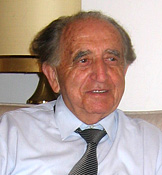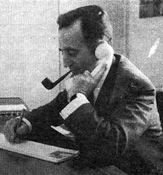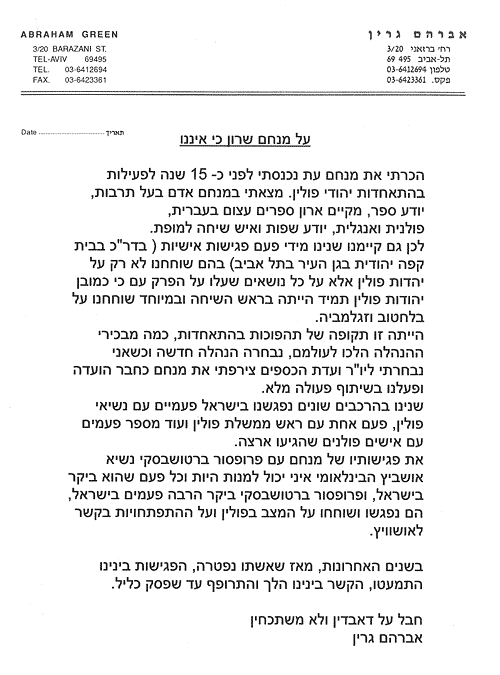![]()
|
|
In Memory of Menachem Sharon (Szmulewicz) (December 5, 1923 - April 1, 2012) |
|
|
At home in 2004. |
At his desk in Warsaw. |
Menachem Sharon (formerly Menachem Szmulewicz), the leader of the Belchatow Landsmannschaft in Israel, died on April 1, 2012 in Israel. His lovely wife, Dafna died 3 years ago. He is survived by daughters Orna and Hanna.
A leader of the Belchatow Community, Menachem lived in Israel after the war. In the late 50s and early 60s, his official title was "Secretary of the Israeli Embassy" in Warsaw, Poland, where he was the Deputy Ambassador.
Israel had diplomatic relations with Poland until 1967. Due to the 1967 war, Poland broke relations for many years. While in Poland, Menachem went back to Belchatow and convinced the town authorities to let him take what was left of the broken headstones in the desecrated Jewish Cemetery and combine them into one memorial for the Jewish community. This now stands in a park in Belchatow. (Photographs can be seen here.)
|
[Click on "cc" for subtitles in English] |
Menachem Sharon's
mother and two brothers were murdered in Chelmno; his father in
Auschwitz. Upon the liquidation of the Lodz Ghetto, Menachem was sent to
Auschwitz. In January 1945, Auschwitz was evacuated and the prisoners
sent on the infamous death marches. Menachem escaped and hid in the
woods until the area was liberated by the Russians. On returning to his native Poland in search of family and friends, Menachem failed to find any survivors. He joined the Bricha movement, aimed at relocating the tens of thousands of refugees and Holocaust survivors from the Soviet Union and Eastern Europe, all trying to leave Europe for Eretz Israel. Only a few succeeded -- illegally -- the majority remaining in Displaced Persons Camps. Menachem and other Bricha activists established crossing points and falsified documents and visas. For three years Menachem liaised with youth leaders, emissaries from Eretz Israel and Jewish Brigade officers in caring for the tens of thousands of Jewish refugees making their way to Eretz Israel to try to rebuild their lives. Menachem was in charge of one of the main crossing points between there and Poland. In Israel, Menachem worked in the Jewish Agency and in the ministries of Defense and of Foreign Affairs. |
|
|
|
|
|
At Menachem Sharon's funeral, Abraham Green, a friend for many years, who came to Israel through the "Bricha" -- the secret operation Menachem was part of (see above), delivered the following eulogy. A former high ranking officer in the IDF, Green is a member of the board of the Central Organization of Holocaust Survivors in Israel and is President of the Organization of Descendents of the Polish Region of Zaglembia, About Menachem Sharon who is no longer with us. |
|
"I first met Menachem about 15 years ago, when I started taking an active role in the Organization of Polish Jews, (Hitachdut Yehuday Polin). I found in Menachem a person of culture who was well read and who was cultivating a huge library including books in Hebrew, Polish and English. Menachem spoke several languages and was a great conversational companion. Due to my appreciation for these qualities of his, we indeed used to hold private, non-work-related meetings (usually at the Judith coffee shop at the Gan Ha'ir Center in Tel Aviv*), during which we discussed not only Polish Jewry but any and every subject that came up and was of interest. Naturally though, Polish Jewry was always at the top of the list and especially Belchatow and Zaglembia. This was a period of substantial change in the organization. Some top management figures had passed on, a new board had been elected. And when I was elected to head the financial committee, I got Menachem to join as member and we cooperated and worked together in harmony. Both of us had the honor of meeting with Polish presidents during visits of these presidents to Israel. We also had the privilege of meeting with the Polish Prime Minister as well as with other Polish dignitaries. I can't say how many times Menachem met with Prof. Bertoshevski, president of The International Auschwitz organization, because every time of the countless number of times Prof. Bertoshevski visited Israel, they met to discuss the situation in Poland as well as new developments concerning Auschwitz. During the last few years, ever since the passing of his wife, our meetings became less frequent and the bond came loose. Sadly lost and not forgotten." [Chaval al deavdin velo mishtakchin.**] * Gan Ha'ir is a stylish half-open-air shopping center next to Tel Aviv City Hall. ** "Chaval al deavdin velo mishtakchin”: This is a traditional saying in ancient Aramaic which is said at the end of a eulogy for a great person or leader. Meaning: We long after the great people who are unfortunately lost to us and no longer with us, because these great people are not common people and therefore impossible to replace or forget. The origin of this saying is in the gmara, Sanhedrin book. God says it to Moses to express his annoyance with him due to his asking questions rather than filling commands blindly. God wishes Abraham, Isaac and Jacob, who did not question God, was still around, but these great forefathers had already been dead, lost and no longer around, but because they were so great and special it was impossible to replace or forget them.
[Translated from the Hebrew, with footnotes, by Miri
Rosental, |
|
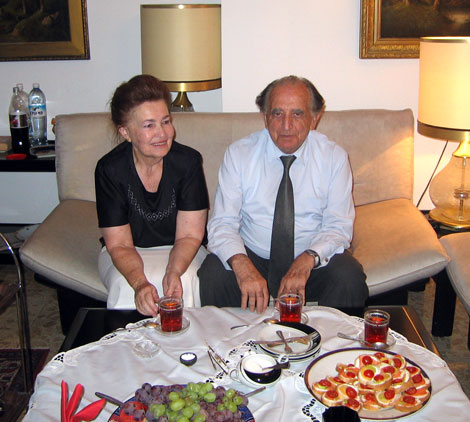
Dafna and Menachem Sharon at their home in Tel Aviv in
2004
[Photo courtesy of Roni Seibel Liebowitz]
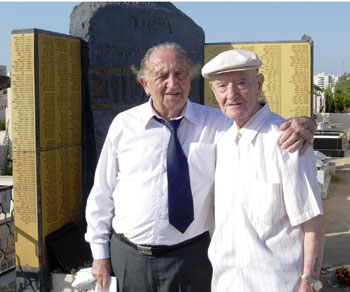
Menachem Sharon with his cousin,
Moshe (Moszek) Rosental (2006)
[Photo courtesy of
Miriam Rosental, Moshe's daughter-in-law]
Click
here for other
photos of Menachem at the
2006 Hazkarah (Memorial Service)
at the Belchatow
Memorial Tombstone
in the Holon Cemetery, Israel
